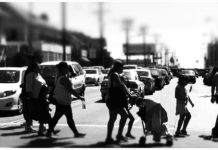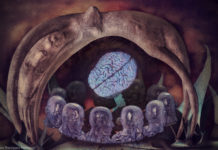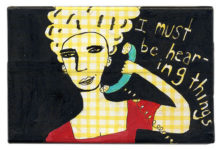Minority and Immigration Status Associated with Psychosis Risk
Ethnic minorities and those who migrated during childhood have an elevated risk for psychosis, study finds.
Hearing Voices Researched at Edinburgh Book Festival
Researchers from Durham University's Hearing the Voice project are attending the Edinburgh International Book Festival through August as part of a study, asking both...
Stigmatizing Effects of the Psychosis-Risk Label
Study examines the effects on participants of being told they are at risk of developing psychosis.
Epilepsy Drugs Can Induce Psychosis in Some Patients, Study Finds
In this month’s issue of the journal Brain a new study investigates whether the drugs prescribed to control seizures can increase the risk of...
New Review of Antipsychotics for Schizophrenia Questions Evidence for Long Term Use
A systematic review of the limited research available on the long-term effects of antipsychotics finds fewer symptoms in those off of the drugs.
Mental Health Nurses Do Not Routinely Assess for Effects of Antipsychotic Medications
Researchers believe that side-effect monitoring is critical because of the increase in the use of antipsychotics
Researchers Explore Sexuality and Gender in the Context of Psychosis
Nev Jones and a team of researchers examine how sex, sexuality, and gender-related content are underexplored in contemporary research on psychosis.
Not So Rare But Rarely Diagnosed: From Demonic Possession to Anti-NMDA Receptor Encephalitis
Throughout the ages, convulsions, contortions of the body and face, including the tongue, super-human strength, catatonic periods, long periods of wakefulness or sleep, insensitivity to pain, speaking in tongues, and a predilection for self-injurious behaviours have all been offered as physical evidence of possession. The modern day interpretation, however, comes with a plot twist befitting a media spectacle. There is growing consensus in the medical community that many prior accounts of “demonic possession” may have represented original accounts of what is now broadly known as autoimmune encephalitis.
A Daughter’s Call for Safety and Sanity in Mental Health
My mother was once a bright, creative, beautiful young woman, a promising artist and a poet, who was captivated by the hippie movement. She was a creative bohemian artist, defying the conventions of our middle-class Jewish Midwestern family, which had carried a tradition of holding emotions inside and acting stoic. One day, soon after my grandparents’ divorce, she left. She hitched a ride to California, and from that point on, was never the same. The police picked her up on a park bench in Arizona, and she was committed for the first time at age 18. She rotated in and out of mental hospitals, the streets, and jail until her death.
Minority Discrimination Linked to Psychosis
A study published in this month’s issue of the Social Psychiatry and Psychiatric Epidemiology found that perceived discrimination related to minority status may precede...
Social Adversity and Crime Victimization Increase Risk of Psychotic Experiences Five Fold
Researchers parse out factors within urbanicity that leads to risk for psychotic experiences.
Auditory Hallucinations – Expectation, Interpretation, and Emotion
Researchers in Australia, the U.K., the Netherlands, Canada and Belgium reviewed research on auditory hallucinations (AH) in schizophrenia as well other clinical and nonclinical...
Voices, Then & Now
As we approach world hearing voices day 2013 Karen and I are in Canada. We have just enjoyed running a preconference workshop for about 100 people in Winnipeg. I am sitting in my room before breakfast writing this piece and as I sit I am thinking back twenty-three years ago; I am in a psych unit in Manchester and I have a new support worker called Lindsay. By then I had been a psych patient for almost ten years and was fast approaching spending the rest of my life in the system. My support worker had convinced me to go to a new group that was starting in Manchester called a hearing voices group.
Study Identifies Psychiatric Patients at Greatest Risk of Coercion
In an effort to reduce coercion, researchers isolate associated factors including age, relationship status, location, and diagnosis.
United Nations Report Calls for Revolution in Mental Health Care
In a new report, the United Nations Special Rapporteur on the right to health, Dr. Dainius Pūras, calls for a move away from the biomedical model and “excessive use of psychotropic medicines.”
The Role of Context, Language, and Meaning in Hearing Voices
Sociocultural context, language, and sense-making process are among concepts that can help hearers and providers better understand the phenomenon of hearing voices
Study Challenges Assumption that Schizophrenia Impairs Cognitive Ability
Secondary factors may impair performance on cognitive tasks, making it difficult for individuals diagnosed with schizophrenia to perform to the best of their ability.
Avatar Therapy: A New Battle for the Tree of Life
In the film Avatar, scientists are keen to exploit the moon planet Pandora which is inhabited by 10-foot-tall blue humanoids called Na'vi. To do so they create Na'vi human hybrids called “Avatars” which are controlled from afar by genetically matched humans. When the scientists decide to destroy the eco-system of the planet to gain access to valuable minerals, war breaks out between the humans and the Na'vi. At this point the main character, Jake, who operates an Avatar, has to choose whose side he is on. Eventually Jake's life is saved and transformed by the Tree of Souls, which the humans are trying to destroy.
Why are Avatars in the news again? The latest innovation from psychiatric research is using computer-generated avatars to help people who hear aggressive voices.
“How I Cope With the Three Unwanted Voices That Live Inside my Head”
What now? I’m frightened of being labelled mentally ill.
The Enduring Myth of the Mad Genius
From Wellcome Collection: It has long been assumed that great writers and artists must be touched by madness. However, no link between artistic talent and...
Dissociative Experiences Mediate Childhood Trauma/Auditory Hallucinations
Researchers in Spain assessed 71 patients diagnosed with psychoses for dissociative experiences, trauma, delusions and hallucinations. Childhood trauma was positively associated with dissociation (r =...
The Sound of Madness
From Harper's Magazine: People who hear positive, encouraging voices often seen as spiritual guides or messages and people diagnosed with schizophrenia are usually thought of as...
More Thinking about Alternatives to Psychiatric Diagnosis
In my last post, I argued that the single most damaging effect of psychiatric diagnosis is loss of meaning. By ruthlessly divesting experiences of their personal, social and cultural significance, diagnosis turns ‘people with problems’ into ‘patients with illnesses.’ Horrifying stories of trauma, abuse, discrimination and deprivation are sealed off behind a pseudo-medical label as the individual is launched on what is often a lifelong journey of disability, exclusion and despair.
Childhood Emotional Abuse Associated with Internal Eating Disorder Voice
Many individuals diagnosed with eating disorders describe and internal ‘voice,’ which may be linked to experiences of childhood trauma and dissociation.
Hearing Voices in the USA
The World Hearing Voices Congress will be landing in Boston, Massachusetts in August. The Hearing Voices movement is up against a lot in this culture where there's so little tolerance for uncertainty and exploration. This movement, this event, and so many people's lives depend on all of us to carry this perspective forward.

























